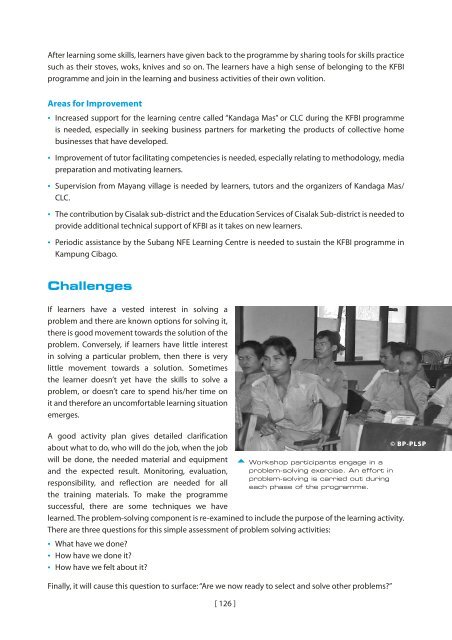Mother Tongue-based Literacy Programmes: Case Studies of Good ...
Mother Tongue-based Literacy Programmes: Case Studies of Good ...
Mother Tongue-based Literacy Programmes: Case Studies of Good ...
You also want an ePaper? Increase the reach of your titles
YUMPU automatically turns print PDFs into web optimized ePapers that Google loves.
After learning some skills, learners have given back to the programme by sharing tools for skills practicesuch as their stoves, woks, knives and so on. The learners have a high sense <strong>of</strong> belonging to the KFBIprogramme and join in the learning and business activities <strong>of</strong> their own volition.Areas for Improvement• Increased support for the learning centre called “Kandaga Mas” or CLC during the KFBI programmeis needed, especially in seeking business partners for marketing the products <strong>of</strong> collective homebusinesses that have developed.• Improvement <strong>of</strong> tutor facilitating competencies is needed, especially relating to methodology, mediapreparation and motivating learners.•Supervision from Mayang village is needed by learners, tutors and the organizers <strong>of</strong> Kandaga Mas/CLC.• The contribution by Cisalak sub-district and the Education Services <strong>of</strong> Cisalak Sub-district is needed toprovide additional technical support <strong>of</strong> KFBI as it takes on new learners.•Periodic assistance by the Subang NFE Learning Centre is needed to sustain the KFBI programme inKampung Cibago.ChallengesIf learners have a vested interest in solving aproblem and there are known options for solving it,there is good movement towards the solution <strong>of</strong> theproblem. Conversely, if learners have little interestin solving a particular problem, then there is verylittle movement towards a solution. Sometimesthe learner doesn’t yet have the skills to solve aproblem, or doesn’t care to spend his/her time onit and therefore an uncomfortable learning situationemerges.A good activity plan gives detailed clarificationabout what to do, who will do the job, when the jobwill be done, the needed material and equipmentand the expected result. Monitoring, evaluation,responsibility, and reflection are needed for allthe training materials. To make the programmesuccessful, there are some techniques we havelearned. The problem-solving component is re-examined to include the purpose <strong>of</strong> the learning activity.There are three questions for this simple assessment <strong>of</strong> problem solving activities:•••What have we done?How have we done it?How have we felt about it?Finally, it will cause this question to surface: “Are we now ready to select and solve other problems?”[ 126 ]Workshop participants engage in aproblem-solving exercise. An effort inproblem-solving is carried out duringeach phase <strong>of</strong> the programme.© BP-PLSP

















